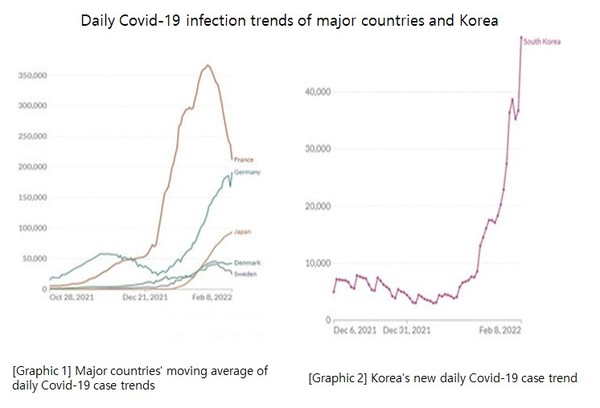As the Omicron wave approaches its peak in Korea, a report has called for the government to gradually revise the quarantine system according to the characteristics of the new variant.
Park Sang-yun, a legislative investigator at the National Assembly Research Service, made these and other points in his paper “Tasks to improve Covid-19 quarantine system according to the prevalence of the Omicron variant,” published in the “Issues and Points” report released on Monday.
“Amid the explosive increase of new virus cases as the Omicron variant becomes a dominant strain, advanced countries are reestablishing their quarantine system to cope with the new situation,” Park said. “Korea also needs to change its quarantine system in the Omicron era or consider going back to the ‘living with Covid-19’ policy.”

According to Park, major foreign countries are shifting to a quarantine system that suits the Omicron variant, easing restrictions and focusing on treatment.
For example, the U.K. marked the peak daily record of 221,222 on Jan. 4 after the Omicron variant emerged as a prevalent strain, but the figure dropped to 53,326 on Feb. 6. Believing that the new virus spread had entered a stable phase, the U.K. government announced a long-term plan to restore normal life while focusing on providing booster shots and prescribing treatments.
In Denmark, the Omicron wave is still underway, but the government has lifted virus curbs. The move is also based on its judgment that the Covid-19 situation is manageable as the share of severely ill patients out of the total daily cases remains at 20-40, fewer than during the Delta wave.
Sweden, too, marked the daily virus cases of 66,670 on Feb. 8 but has reportedly lifted almost all viral curbs, as 85 percent of people have been vaccinated, and 55 percent boosted.
“Given the major countries’ examples, Korea’s Omicron wave is likely to peak in late February and enter a stable phase in March or April,” Park said. “As more Koreans are expected to get infected in the future, the government needs to establish a quarantine system following the characteristics and spreading speed of the Omicron variant.”
He emphasized the need to strengthen at-home treatment capacity and introduce more booster shots to build a new quarantine system customized to the Omicron variant.
“Omicron shows strong contagiousness but minor symptoms,” he said. “Therefore, the quarantine authorities ought to conserve medical capacity through at-home treatment instead of hospitalizing patients, and establish an efficient healthcare system through crisis management a little stronger than flu.”
Citing that Israel has been experiencing a continuous increase in severely ill patients since the lifting of virus cubs, Park said the Israeli government attributes it to the weakened effects of booster shots.
“That stressed the need to manage the Omicron variants to keep them from progressing to severe cases through the continuous offering of booster shots,” Park said.
He also emphasized that while managing Covid-19, the government ought to relax its quarantine system, considering its social and economic effects comprehensively.
“The U.K. and North European countries have lifted most virus restrictions despite the spread of the Omicron variant,” Park said. “That’s because the higher vaccination rate is keeping the share of severely ill patients to a manageable level, and the symptoms of the Omicron variant remain mild compared to the Delta variant.”
These European countries seem to have judged that the social and economic damage resulting from continuous restrictions is larger than from Covid-19. Therefore, while managing the crisis through vaccines and treatments, the government ought to flexibly improve its quarantine system to minimize socioeconomic losses, he said.
“As the example of gradual easing of curbs, the U.K. government maintains the vaccine mandate at large event venues or businesses and educational institutions voluntarily check vaccine passes,” Park said. “In Korea, however, the Omicron’s spread is still going on, making it necessary for the health authorities to take a gradual approach to the extent that they can manage it.”

